Denis Diderot received a luxurious robe as a gift. Beautiful, noble. But too beautiful for the rest of his furniture. So he replaced the old armchair. Then the desk. Then the carpet...
In the end, everything was new. And the wallet was noticeably lighter.
Everyone knows what he experienced: a single purchase leads to a chain of further purchases. Not out of need, but because the new no longer fits in with the old. This psychological pattern has a name: Diderot effect.
Here you can find out what is behind it, how it influences our consumer behavior and how you can use it specifically in marketing and online marketing.

Table of contents
What exactly is the Diderot effect?
The Diderot effect describes a psychological pattern in which a single new possession triggers a cascade of further purchases. Not because they are necessary, but because they should correspond to the new object. The possession changes the self-image and this new self-image demands consistency.
The origin lies in a text by Denis Diderot. In his essay "On the misfortune of being master of one's old robe", he tells the story of how a robe given as a gift called his entire home into question. The new piece was noble. The rest suddenly seemed old, wrong, out of place. So he gradually replaced almost everything.
There is more to the effect than just consumption. It is about consistency behavior: People want a coherent overall picture. A new object changes our self-image. And this new image calls for additions.
There are examples of this everywhere:
- A new sneaker that needs matching pants.
- An expensive cell phone that cries out for accessories.
- A new desk to replace the old chair.
The origin: Diderot's essay and its lesson
Denis Diderot was a philosopher, writer and editor of the French encyclopaedia. In 1769, he wrote a short text that is still astonishingly relevant today: "On the misfortune of being master of one's old robe".
In it, Diderot tells a simple story: he receives a luxurious robe as a gift. The new fabric, the rich color, the fine workmanship - all this lifts him to a new aesthetic level. But this sudden splendor makes the rest of his surroundings seem inferior. The old armchair? Unworthy. The desk? A foreign object. Piece by piece, he replaces his entire inventory.
The punch line is bitter: Diderot not only loses money, but also his satisfaction with what was previously completely sufficient for him.
The lesson is more profound than it first appears. Diderot is not describing a material problem, but a psychological one: the pursuit of a uniform self-image can draw us into a vortex of consumption that is neither planned nor rational.
His essay was never intended as an economic theory. And yet today it provides the basis for one of the sharpest concepts in the field of consumer psychology.
How the Diderot effect manifests itself in everyday life
We often don't even realize how a single purchase influences our subsequent decisions. What begins as a rational purchase changes our aesthetic perception, our expectations and our consumer behavior.
A feeling of incongruity arises as soon as the new no longer fits in with the existing. So we adapt. Supplement. Replace. Always with the aim of creating a coherent overall picture.

We often don't even realize how a single purchase influences our subsequent decisions. What begins as a rational purchase changes our aesthetic perception, our expectations and our consumer behavior.
A feeling of incongruity arises as soon as the new no longer fits in with the existing. So we adapt. Supplement. Replace. Always with the aim of creating a coherent overall picture.
Technology
Living
A designer lamp changes the effect of the room. The furnishings should "fit together". Furniture is replaced, colors are coordinated, the style is completely changed.
Digital
Fashion
A new pair of shoes calls for matching trousers. The old jacket suddenly looks out of place. Accessories such as belts and bags also come into focus.
Lifestyle inflation
As income rises, demands often rise too. What was "good enough" yesterday is too easy today. New standards lead to new expectations and therefore to new expenses.
The Diderot effect works like a domino. A single impulse is enough to topple a whole series of other decisions. Not because they are necessary, but because they suddenly seem unavoidable.
Psychological depth: Why our brain ticks like this
There is more to the Diderot effect than aesthetic perception or consumerism. It touches on central mechanisms of our psychological structure. The need for consistency, social status comparison and the construction of identity are particularly crucial.
Consistency theory:
Social comparison:
Identity construction:
Ownership is an expression of self-image. We don't just buy things, we buy meanings. A certain style, a branded product or an aesthetically pleasing environment signals who we want to be - and who we no longer are. The Diderot effect reinforces this process: new things define identity, old things suddenly seem strange.
These psychological principles operate subtly but constantly in the background. They make the Diderot effect not a slip-up, but a stable part of our decision-making architecture.
The Diderot effect in online marketing: from impulse to shopping cart
1. style worlds instead of individual products
2. "Customers also bought..." as a psychological lever
3. seduction through personalization:
4. consistency logic in design
5. dynamic targeting
Cross-selling and the Diderot effect
The Diderot effect does not belong in a historical textbook, but in the toolbox of modern sales strategies. It lives in the logic of modern online stores, especially in cross-selling. After all, anyone who manages to follow up an initial purchase with further decisions is using precisely this psychological mechanism.
What is cross-selling actually?
Cross-selling means offering customers suitable additional products after the initial purchase. This could be accessories, a stylistically coordinated product or a complementary service. The aim is to increase the value of the shopping basket and create a more rounded shopping experience.
Why does the Diderot effect apply here?
After the first purchase, the frame of reference changes. A new product creates a desire for stylistic or functional additions. The Diderot effect explains precisely this dynamic: it is not the new product that is the problem, but the desire for everything else to match.
When does cross-selling work?
If recommendations are perceived as appropriate, helpful and stylistically coherent, they have a deep impact. They close mental gaps. They reinforce the new self-image. They do not come across as advertising, but as a logical consequence.
When does cross-selling turn into reactance?
Too many, too obvious or too arbitrary suggestions trigger reactance. Users then no longer perceive the process as support, but as pressure. Trust breaks down. Psychological consistency becomes a purchase blockade.
What does this mean in practice?
Cross-selling is not a technique, but a work of trust. If you want to use the Diderot effect in a targeted way, you need to know the fine line: Complement instead of persuade. Encourage rather than push. Provide guidance, but do not direct.
The Diderot effect in the field of tension between sustainability and minimalism
Buying more because something new doesn't go with the old. This is precisely what contradicts a conscious, sustainable lifestyle. Anyone who lives a minimalist lifestyle or pays attention to conserving resources will recognize that the Diderot effect is not just a psychological pattern, but a problem.
This is because the effect contradicts the principle of "enough is enough". It starts where consumption becomes a question of identity. It is not the function that counts, but the feeling of coherence. And this leads to things being replaced even though they are still perfectly usable.
Minimalism as a counter-movement
The paradox of green shopping
The effect can also be seen in sustainable consumption. Often more subtle. Organic furniture, fair fashion, recycled decorative items. All of this suggests consumer awareness, but often follows the same logic as conventional consumption. Replacing everything old with new, green alternatives does not automatically make you more sustainable. It is mainly the aesthetics that change, not necessarily the behavior.
Between attitude and action
The Diderot effect leads to an uncomfortable question: is sustainable consumption really about less or just better? And how great is the danger that we soothe our guilty conscience with new purchases instead of fundamentally questioning our behavior?
If you want to consume consciously, you don't have to fight against the Diderot effect. But they do have to recognize it. Because real sustainability doesn't start in the shopping cart. It begins with the decision as to whether something belongs in there at all.
How to escape the Diderot effect
Escaping the Diderot effect does not mean not buying anything at all. It's about consuming more consciously and not being driven by the logic of addition. A first step is to ask yourself before every purchase whether there is a real need behind it or just a feeling that something should fit better. This distinction alone can change many things.
It is also helpful to set yourself a simple rule: For every new item, an old one leaves the household. This creates a natural filter. If you then accept that not everything has to be perfectly coordinated, you can free yourself from the inner pressure to create harmony. Not every contrast has to be resolved.
Another lever is the budget. If you consciously set yourself a monthly upper limit for consumer spending, you force yourself to prioritize. This not only protects your bank account, but also prevents impulsive decisions. Especially online, it is worth incorporating deliberate purchase delays - for example, by using the 24-hour rule or saving items in the shopping cart instead of buying them immediately. This creates distance between impulse and action.
But the most important point is mental: incompleteness is not a defect. It is normal. If you can stand it, you remain capable of acting. Even when the new robe has long since arrived.
Conclusion: The Diderot effect affects us all
The Diderot effect shows the extent to which consumer behavior is linked to identity, aesthetics and psychological coherence. It explains why a single purchase often does not stand on its own. And it shows how easily a desire for appreciation can turn into automatism.
For consumers, this means:
Creating clarity before the chain begins. What do I really want and what is just a reflex to something new?
For marketers, this is precisely where an opportunity lies:
Those who understand how consistency and self-image shape purchasing decisions can develop recommendations that work. Not because they impose, but because they feel like the logical continuation of the first impulse.
💡 The Diderot effect works on both sides of the shopping basket, which is precisely why it is worth understanding.
Further psychological triggers

Halo effect
The halo effect ensures that a single quality influences the entire image.
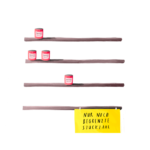
Scarcity
The feeling that something could soon no longer be available arouses desire.

Dunning-Kruger effect
The effect describes how people with little experience overestimate their abilities.

Mere exposure effect
The more often we see, hear or experience something, the more we like it.
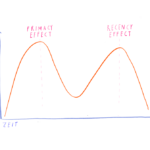
Primacy effect
The first piece of information remains most strongly in our memory and shapes our perception.

Nudging
Nudging uses small incentives to subtly guide behavior without restricting freedom of choice.
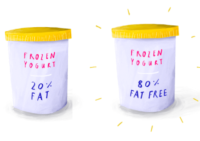
Framing effect
The way in which information is presented significantly shapes perception.
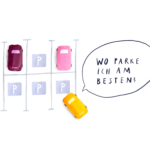
Paradox of Choice
Many options can seem overwhelming. Few options simplify the decision.
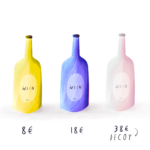
Decoy effect
When we are presented with an unattractive option, the more attractive alternative seems even more tempting

Affect heuristics
Quick decisions are often guided by strong feelings rather than rational considerations.

Social Proof

Endowment effect
People tend to attribute a higher value to things just because they are in their possession.

Diderot effect
The effect describes how a new purchase awakens the desire to buy more suitable products.

New
The way in which information is presented significantly shapes perception.

New
When we are presented with an unattractive option, the more attractive alternative seems even more tempting

